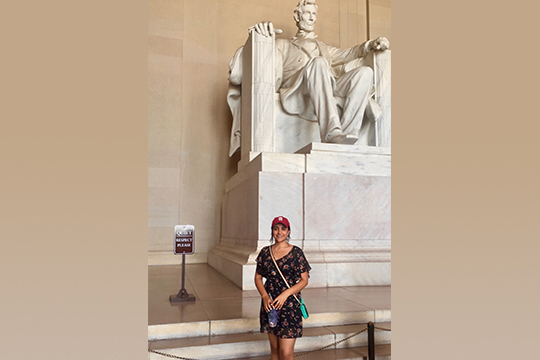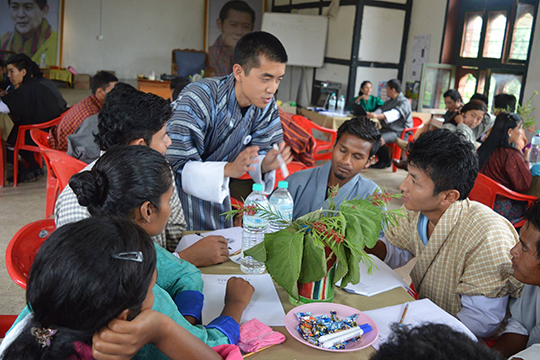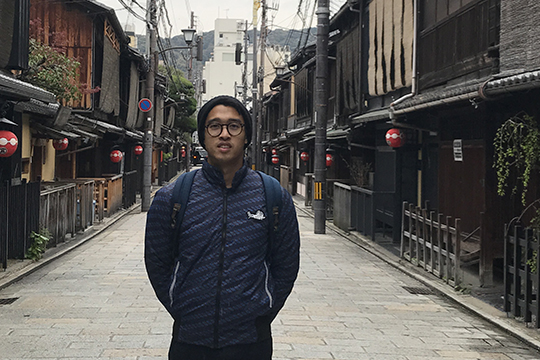Posts published in June, 2017

Advocating for responsible energy use
By Sadaf Sobhani, B.S./M.S. ’15; PhD Candidate
I spent last summer in Washington, DC working as an intern at the Energy Future Coalition, an initiative of the United Nations Foundation (UNF). As a PhD student in Mechanical Engineering, I work on developing computational tools to investigate alternative combustion systems. I spend most days writing code or discussing the technical details of my research. So the transition to Pennsylvania Ave was dramatic. Just the walk from the Farragut North station to my UNF office, located between the White House and the World Bank, was enough to remind me of the incredible opportunity I was given to work in the nation’s capital.
During the summer, I was involved with the Clean Fuels campaign, which calls attention to the epidemiological and environmental risks associated with the combustion of aromatic compounds in fuels. With my background in combustion science and engineering, I was able to contribute to the team’s efforts by translating the current scientific research into a comprehensive white page on the sources and potential impacts of emissions from automobiles, focusing on the influences of specific gasoline components and ethanol-gasoline blending. My work aimed to give insight into potential technical and policy responses to this issue. Through this experience, I gained a deeper appreciation for the complex processes involved in developing and implementing policies that advance us towards a more sustainable and cleaner energy future, a journey that I want to be actively involved in – both as a scientist and an advocate.
Schneider Fellows work at leading U.S. nongovernmental organizations (NGOs) to tackle today’s sustainable energy challenges.

Investing in Bhutan’s youth
By Tim Huang, ’14 (B.A. Human Biology; M.A. Education)
I was drawn to the Himalayan Kingdom of Bhutan because of my interest in how the young democracy in transition was thinking differently about sustainable development and the well-being of its people. Thanks to a Haas summer fellowship, I spent two consecutive summers in college implementing a youth employment project with a local nonprofit, the Bhutan Youth Development Fund. After graduating from Stanford, I returned to Bhutan through the Omidyar Network International Public Service Fellowship, one of the Haas Center’s postgraduate fellowships. During my fellowship year, I worked to strengthen educational equity as a researcher for the Royal Academy, His Majesty the King’s Secretariat. I have since served as a Program Officer at the Bhutan Youth Development Fund, organizing child protection and youth empowerment programs with partners like UNICEF. Over the last 3 years, working in Bhutan has reinforced my belief that investing in the promise of our children and youth creates a more just and sustainable world.

Complex, messy – and rewarding
 By Paricha Duangtaweesub, MS ’15 (Chemical Engineering)
By Paricha Duangtaweesub, MS ’15 (Chemical Engineering)
“What do you want to do after school?”
I rapidly became familiar with this question during my graduate studies, and soon I found myself responding with one version or another of the same response: “I want to apply what I learned to make an impact in renewable energy.”
I was a naïve student of chemical engineering then, cherry-picking engineering classes in renewable energy, crossing over to the GSB and d.school to round out my education. I thought social impact work would be straightforward and well defined, with the benefits as measurable as my grades or the applause after presentations. Did I mention I was naïve?
With much excitement, I accepted a summer Schneider Fellowship at the Natural Resources Defense Council in San Francisco right after graduation where I contributed to advocacy work in energy efficiency policy in California and India. Between studying technical potential of bio gas, writing comments to an ordinance proposed by the City of Palo Alto, and preparing a case study of building codes for Hyderabad, the learning experience was both challenging and rewarding.
I found that systems of people can be far more complex than any mathematical models taught in class. It is imperative that we understand the different needs of the stakeholders within the system that we promised to help – city residents, politicians, business owners, and government agencies – as well as the environment. As an engineer, I learned an important lesson: that technical knowledge is only part of the answer.
Schneider Fellows work at leading U.S. nongovernmental organizations (NGOs) to tackle today’s sustainable energy challenges.
